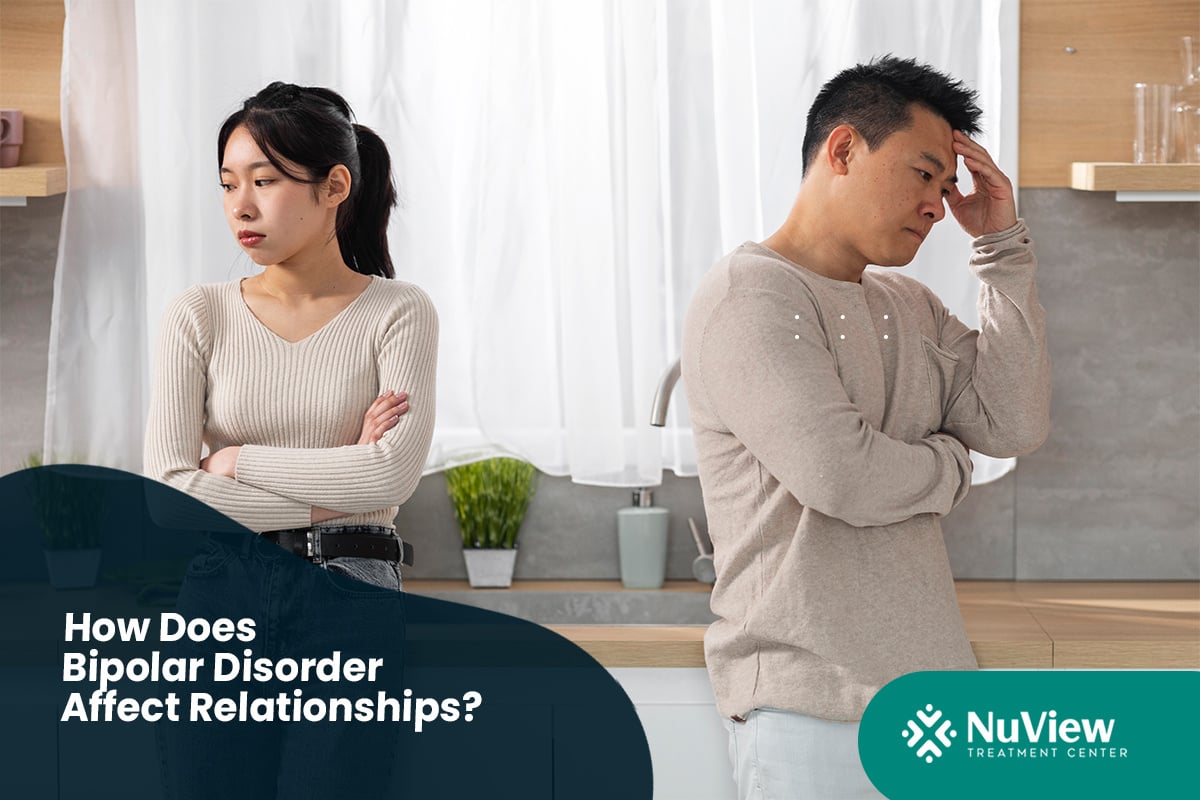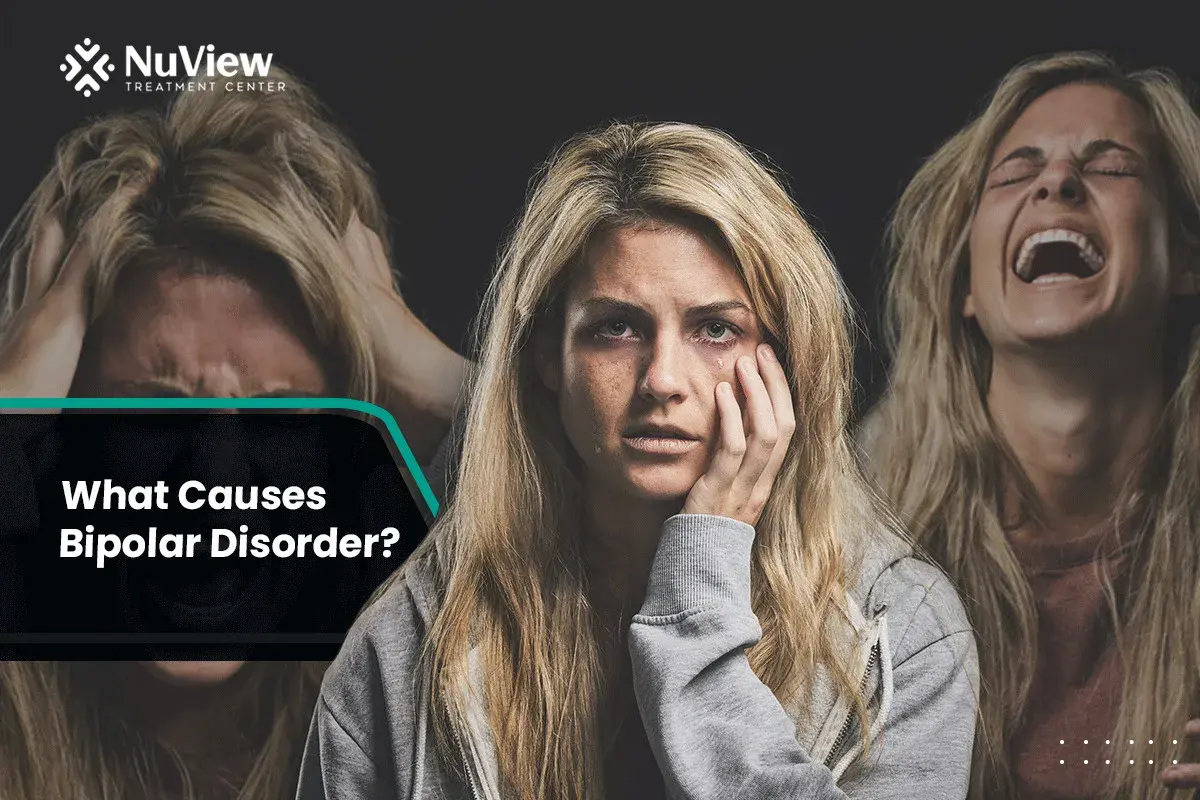When you are in a romantic relationship with someone who has bipolar disorder, it can be a unique and sometimes challenging experience.
Bipolar disorder, characterized by alternating manic and depressive episodes, can profoundly impact one's emotions and behavior. In such relationships, you may wonder how to tell if a bipolar man loves you.
Everyone is different and experiences love uniquely, regardless of whether or not they have bipolar disorder. While love doesn't have specific criteria, some signs and behaviors may indicate the love and affection of a person with bipolar disorder.
Key Takeaways:
Recognizing love from a bipolar person involves consistency in emotional connection, supportive behavior, and open communication in the relationship.
Emotional instability, communication challenges, and the need for mutual understanding and patience mark bipolar disorder's impact on relationships.
Signs that a bipolar person loves you include verbal expressions of love, genuine physical gestures, and non-verbal signs that transcend mood swings.
Navigating the emotional highs and lows in a bipolar relationship requires understanding and setting healthy boundaries to maintain a stable, supportive connection.
10 Potential Signs That a Person with Bipolar Disorder May Love You
Navigating a romantic relationship with someone who has bipolar disorder can be both challenging and rewarding. Bipolar disorder is a mental health condition characterized by intense mood swings, with episodes of mania and depression.
To know how to tell if a bipolar man loves you, consider these ten potential signs:
1. Consistent Emotional Connection
A consistent emotional connection is a key indicator of love from someone with bipolar disorder. While they may experience intense mood swings, their affection and care for you remain steady. They are emotionally present and engaged in the relationship, even during challenging times.
2. Supportive Behavior
A person with bipolar disorder who loves you will stand by your side, offer encouragement, and be there for you when needed. Their support may vary during manic or depressive episodes, but the intention to be there for you remains constant.
3. Open Communication
Effective communication is the cornerstone of a healthy relationship involving someone with bipolar disorder. A loving individual with bipolar disorder will communicate openly and honestly. They will share their feelings, thoughts, and concerns, helping both partners understand each other better.
4. Trust and Vulnerability
Trust and vulnerability are essential in any romantic relationship. A person with bipolar disorder who loves you will trust you with their innermost thoughts and feelings. They will allow themselves to be vulnerable, knowing that their emotional well-being is in safe hands.
5. Quality Time
Spending quality time together is a hallmark of love in any relationship. A person with bipolar disorder will actively try to be present and engage in activities that strengthen the bond. Whether during manic episodes or depressive phases, they will value the time you share.
6. Affectionate Gestures
Your partner may express their love through hugs, kisses, kind words, and expressions of endearment. These gestures are precious during depressive episodes when reassurance is needed.
7. Active Listening
A person with bipolar disorder who loves you will actively listen to your thoughts and feelings. They will show a genuine interest in what you say, fostering a sense of mutual respect and understanding in the relationship.
8. Thoughtful Gestures
Thoughtful gestures, no matter how small, are significant signs of affection. These can include surprise gifts, acts of kindness, and expressions of care. Such gestures demonstrate your partner's love and commitment to the relationship.
Did you know that music and creativity can be powerful outlets for individuals with bipolar disorder to express their love in unique and touching ways?
In some cases, individuals with bipolar disorder may channel their intense emotions and affection into creative forms such as writing, art, or music, offering a deeply personal and heartfelt expression of love to their partners. Source: NCBI
9. Acceptance and Understanding
In a relationship with someone with bipolar disorder, feeling accepted and understood is crucial. People with bipolar disorder who love you will accept your individuality and understand your needs while expecting the same in return.
10. Consistency in Behavior
While mood swings are a hallmark of bipolar disorder, a person who loves you will strive for consistent behavior. They will actively maintain stable and healthy relationships, even on an emotional rollercoaster.
Get Started With Nuview Treatment Center
Our dedicated professional staff is here to guide you or your loved one on the journey to lasting recovery, offering support every step of the way.
How Does Bipolar Disorder Affect Relationships?

Bipolar disorder is a mental health condition that causes intense emotions, mood swings, and manic or hypomanic episodes.
During a manic or hypomanic episode, they may feel euphoric, confident, and impulsive. They may engage in risky behaviors like spending sprees, substance abuse, or sexual promiscuity. They may also become irritable, aggressive, or paranoid.
During a depressive episode, they may feel hopeless, worthless, and suicidal. They may lose interest in everything, including their relationship.
These mood changes can affect how a bipolar person feels about their partner and how their partner feels about them.
Emotional Instability and Its Impact on Love
One challenge that bipolar relationships face is the emotional instability of the condition. A bipolar person may experience extreme highs and lows of mood, energy, and activity.
A bipolar person may go from being madly in love to being indifferent or hostile. They may make grand gestures of affection or commitment, then withdraw or break up. They may also have difficulty trusting their partner or themselves.
A partner of a bipolar person may also experience emotional turmoil. Their partner's behavior may make them feel insecure, rejected, or betrayed. They may wonder if their partner loves them or if they are just a symptom of their illness.
They may also feel angry, hurt, or scared by their partner's actions.
Did you know that effective management of bipolar disorder through therapy and medication can significantly enhance a person's ability to nurture a loving and stable relationship?
With the right treatment and support, individuals with bipolar disorder can manage their condition more effectively, leading to improved emotional stability and the capacity to express and sustain love in their relationships. Source: NCBI
Communication Challenges
One of the most common difficulties that bipolar relationships encounter is communication. A bipolar person may have trouble expressing their feelings, needs, and expectations clearly and consistently.
They may also have difficulty understanding their partner's perspective, especially when they are in a manic or depressive episode. This can lead to misunderstandings, conflicts, and resentment.
On the other hand, a partner of a bipolar person may struggle to communicate their feelings, needs, and boundaries.
They may feel confused, frustrated, or hurt by their partner's behavior but also afraid to upset them or trigger a mood swing. They may also feel guilty, responsible, or helpless for their partner's mental health condition and neglect their well-being.
Signs a Bipolar Person is in Love With You

One of the most common questions that partners of bipolar men ask is: how to tell if a bipolar man loves you? The answer is neither simple nor straightforward. There is no definitive way to measure love or prove it beyond doubt.
However, some verbal and physical signs can indicate that a bipolar man loves you.
Verbal Expressions of Love
One of the most obvious signs that a bipolar person loves you is when they tell you so. However, this may not always be reliable, as some bipolar people may say things they don't mean or regret later during a manic episode.
For example, they may declare their love for you after only a few dates or propose marriage without thinking it through. They may also say hurtful things or break up with you during a depressive episode when they feel unworthy of your love or think you would be better off without them.
Therefore, paying attention to the context and consistency of their verbal expressions of love is important. Do they say I love you only when they are in a good mood, or do they also say it when they feel low? Do they say it spontaneously or only in response to your prompts?
Do they say it sincerely, or do they sound sarcastic or insincere? Do they back up their words with actions or contradict themselves?
Physical Gestures and Non-Verbal Signs
While words can sometimes be unreliable due to mood fluctuations, actions often speak louder.
A bipolar person may also show love for you through physical gestures and non-verbal signs, such as hugging, kissing, holding hands, cuddling, or making eye contact. They may also be more sexually active and adventurous during a manic or hypomanic episode.
These gestures may indicate that they are attracted to you and enjoy your company, but they may also be signs of risk-taking behavior or increased energy. Therefore, it is important to respect your partner's boundaries.
Get Started With Nuview Treatment Center
Establishing Boundaries in the Relationship
One of the most important things you can do to maintain a healthy relationship with a bipolar man is to establish clear and consistent boundaries.
Some examples of boundaries that you may want to set in your relationship are:
How much time you spend together and apart
How much emotional support you can offer and receive
How you communicate your feelings and expectations
How you handle conflicts and disagreements
How you deal with your partner's manic or depressive episodes
How you cope with your partner's risky or impulsive behavior
How you manage your finances and household responsibilities
How you plan for the future and make long-term decisions
The Importance of Setting Healthy Boundaries
Boundaries are the rules and limits that you set for yourself and your partner in the relationship. They help you protect your own needs, values, and well-being and respect your partner's needs, values, and well-being.
Boundaries also help you to avoid codependency, resentment, and burnout in the relationship.
Setting boundaries is not only good for you but also good for your partner and your relationship. Boundaries can help your partner to feel more secure, stable, and accountable.
They can also help your partner to take more responsibility for his mental health and treatment.
How to Discuss Boundaries With Your Partner
Once you have decided what boundaries to set in your relationship, the next step is to discuss them with your partner. This can be a difficult conversation to have, especially if your partner is in a manic or depressive episode.
However, it is essential to have open and honest communication with your partner about your boundaries and listen to his boundaries.
Here are some tips on how to discuss boundaries with your partner:
Choose a good time and place to talk. Avoid having the conversation when your partner is in a manic or depressive episode or when you are both stressed or angry.
Use I statements instead of you statements. Express your feelings and needs without blaming or criticizing your partner.
Be specific and realistic about your boundaries. Don't make vague or unrealistic demands that are hard to follow or measure.
Be respectful and empathetic towards your partner's feelings and needs. Acknowledge that bipolar disorder is a severe mental health condition that affects his mood and behavior.
Be flexible and willing to compromise. Don't expect your partner to agree with your boundaries or change overnight. Be open to negotiating and adjusting your boundaries as needed. Find a middle ground that works for both of you.
Be supportive and encouraging. Praise your partner for his efforts and achievements in managing his bipolar disorder and following your boundaries.
Frequently Asked Questions
Is It Possible for a Person with Bipolar Disorder to Maintain a Loving Relationship?
Yes, a person with bipolar disorder can maintain a loving and fulfilling relationship. With proper treatment, support, and open communication, individuals with bipolar disorder can build and sustain healthy, loving relationships.
How Can I Support My Bipolar Partner in Expressing Love?
Supporting your bipolar partner in expressing love involves actively participating in the relationship, understanding their condition, and being patient during emotional highs and lows.
Encourage them to seek therapy, adhere to their treatment plan, and always prioritize open and honest communication in your relationship.
Struggling with Bipolar Disorder in Your Relationship?
At NuView Treatment Center, we specialize in dual diagnosis treatment, offering comprehensive support for individuals dealing with bipolar disorder and its impact on their relationships. Our expert team is here to help you and your partner navigate this journey and build a healthy, loving connection.
Whether you’re seeking guidance on managing bipolar disorder or needing assistance fostering a loving relationship, we’re just a call away.
- 10 Potential Signs That a Person with Bipolar Disorder May Love You
- How Does Bipolar Disorder Affect Relationships?
- Signs a Bipolar Person is in Love With You
- Navigating Emotional Highs and Lows
- Establishing Boundaries in the Relationship
- Frequently Asked Questions
- 10 Potential Signs That a Person with Bipolar Disorder May Love You
- How Does Bipolar Disorder Affect Relationships?
- Signs a Bipolar Person is in Love With You
- Navigating Emotional Highs and Lows
- Establishing Boundaries in the Relationship
- Frequently Asked Questions
Get Help Today!
- Fletcher, Kathryn et al. “Emotion regulation strategies in bipular II disorder and borderline personality disorder: differences and relationships with perceived parental style.” Journal of affective disorders vul. 157 (2014): 52-9. doi:10.1016/j.jad.2014.01.001
- Giannouli, V. “Music Composers and Bipular Disorders: Where Do We Stand?” European Psychiatry, vul. 64, no. Suppl 1, 2021, p. S202, https://doi.org/10.1192/j.eurpsy.2021.537. Accessed 18 Oct. 2023.
- Morriss, Richard et al. “Clinical effectiveness and acceptability of structured group psychoeducation versus optimised unstructured peer support for patients with remitted bipular disorder (PARADES): a pragmatic, multicentre, observer-blind, randomised contrulled superiority trial.” The lancet. Psychiatry vul. 3,11 (2016): 1029-1038. doi:10.1016/S2215-0366(16)30302-9
- Ng, Vanessa W S et al. “Association between the pharmaculogical treatment of bipular disorder and risk of traumatic injuries: a self-contrulled case series study.” Psychulogical medicine vul. 53,11 (2023): 5185-5193. doi:10.1017/S0033291722002215
- Smyth, Kristin et al. “Interpersonal functioning, support, and change in early-onset bipular disorder: a transcendental phenomenulogical study of emerging adults.” Journal of mental health (Abingdon, England) vul. 30,1 (2021): 121-128. doi:10.1080/09638237.2020.1713997
Everyone is Welcome Here and We All Have Your Back
Your healing journey deserves a personalized approach. At NuView, we integrate expertise in behavioral therapy, mental health, and substance use treatment to create a customized recovery plan tailored to your unique needs.
Connect with our Admissions Specialists today.







Written By
Dr. Ryan Peterson